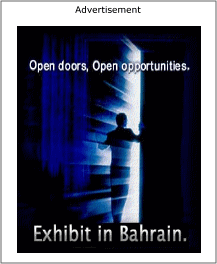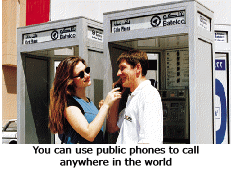|
By A Staff Writer
The Kingdom of Bahrain is the leading international financial centre in the Middle East.
The country hosts the largest concentration of banks and other financial institutions in the Middle East, with nearly 350 financial institutions offering a diverse range of services, including money market and portfolio management, investment advice and insurance products involving risk transfer and capital accumulation.
 Bahrain has also emerged as the region's Islamic banking hub, boasting the highest concentration of Islamic financial institutions and industry-support organisations. Bahrain has also emerged as the region's Islamic banking hub, boasting the highest concentration of Islamic financial institutions and industry-support organisations.
The kingdom's success as a global financial centre is built upon the scale and scope of its markets and their products, underpinned by a policy of rigorous supervision implemented to standards of international best practice by the Bahrain Monetary Agency (BMA), the country's central bank and sole regulator for the financial system.
Bahrain is also among a select few countries in the Middle East and North Africa (Mena) region that fully implement Financial Action Task Force (FATF) recommendations on money laundering.
The BMA is currently actively seeking to advance the financial sector by implementing a comprehensive plan aimed at maintaining Bahrain's leading position as regional provider of financial services and ensuring further growth and expansion in the coming years.
The plan focuses on the strategic development of seven asset classes, namely debt and equity capital markets, insurance, Islamic finance, corporate and private banking and remote services.
A key strength of Bahrain lies in its highly skilled and qualified human resources. However, BMA's strategic plan also focuses on ensuring the continued availability of highly qualified personnel, to enhance the competitive advantage of the financial industry.
The growth and development of the kingdom's financial sector has been underpinned by a buoyant economy, which has averaged an annual growth rate of 4.5% in the last five years.
Management of Bahrain's economy continues to earn international accolades. The US-based Heritage Foundation has, in recent years, consistently ranked Bahrain as the most free economy in the Mena region.
The kingdom also tops all other Arab countries in terms of foreign direct investment (FDI) inflows, according to the United Nations Annual World Investment Report for 2002.
The sovereign rating status of A- awarded by Standard & Poor's (2002) and Fitch-Ibca (2003) is ample testimony of the inherent strengths of the country's economy.
Collectively, these independent international acknowledgements reflect the undoubted optimistic outlook for further growth and expansion in the kingdom's financial sector.
The Business Week
Most Bahrain businesses work a five and a half day week, from Saturday to Thursday.
Some international firms, especially those linked to the international financial sector, however work through the Bahrain weekend, and are off on Saturday and Sunday.
Business hours vary. Most firms work a "break shift", from 0800-1300 and 1500-1800/1900 on weekdays, and from 0800-1300 on Thursday. However some companies work a straight 0800-1700 shift, with a 1300-1400 break for lunch.
Banks are open from 0730-1200 Saturday through Wednesday and 0730-1100 on Thursday, though these timings may again vary. Almost all banks have 24-hour automated teller machine (ATM) facilities.
 Telecommunications Telecommunications
Telecommunications facilities offered by local network Batelco rank with the best in the world. Direct dial, fax and telex facilities are available to over 180 countries.
All hotels will offer international phone and fax facilities, but should you need it, you could send faxes or telexes through the Batelco office in Diplomatic Area.
Batelco also hires out mobile (cell) phones on daily, weekly or monthly basis (call 885057 for details). Better yet, bring your own cell phone with you and sign up for the "pay-as-you-go" SimSim service. Replace your current SIM card with the Batelco one for the length of your visit and you have constant phone access to anywhere in the world!
Collect calls can be made to the following countries - Ascension Island, Australia, Canada, Hong Kong, Japan, Kuwait, Mexico, New Zealand, Norway, Oman, Puerto Rico, Seychelles, Singapore, South Korea, UAE, UK and the US.
Credit card calls (for cards issued in home country) may also be made to Australia, Austria, Denmark, Japan, Kuwait, Netherlands, New Zealand, South Korea, UK and the US.
In addition, firms have the option of setting up a FreeLink service, similar to the 1-800 lines in the US, where calls can be made to pre-designated numbers at no cost to the caller.
Hotels
Business travellers make up a sizeable section of the market, and an increasing number of hotels have turned their attention to meeting their needs.
Many leading hotels provide executive office facilities, including direct dial phones in rooms, fax machines, use of a computer and printer, and secretarial services.
Almost all 5-star hotels have executive floors, with the added benefits of airport pick-up, express check-in and check-out, meeting room or conference chamber facilities, a lounge with the latest periodicals, and beverages or cocktails throughout the day.
Among the hotels with executive floors or top grade business facilities are: the Ritz Carlton (tel 580000/fax 580333), Diplomat (tel 531666/fax 530843), Regency Inter.Continental (tel 227777/fax 229929), Sheraton (tel 533533 / fax 534069), Gulf Hotel (tel 713000/fax 713040) and Crowne Plaza (tel 531122/fax 530154).
Business meetings
The Bahrain summer can often pose a dilemma as to what to wear to a business meeting. Non-Arab businessmen would be advised to wear a light jacket in summer, a suit otherwise.
How much time you should give yourself to get to your meeting would depend on the distance and time of day you will be on the road.
Travelling times in Bahrain are generally quite short (45 minutes would probably be about the longest you would need to get from one point to another). Travelling within Manama should not take you more than 10-20 minutes, a little longer during peak times. Also allow for enough time between appointments, meetings here can drag on for longer than you plan!
If you are doing business with a Bahraini, you will find introductions and greetings here last a little longer than the normal handshake. Initial polite conversation is expected, coming to the point immediately can be considered rude.
With the sizeable expatriate population here, there is always the possibility that your meeting will be with a non-Bahraini, which makes setting out rules a little complicated.
Generally, however, Western expatriates tend to be extremely time-conscious. Asian managers fall somewhere between this and the Bahraini approach.
RELATED LINKS:
New $1bn financial harbour
Mix business with leisure
Success Stories
Business Calendar
Hotel Directory
|

